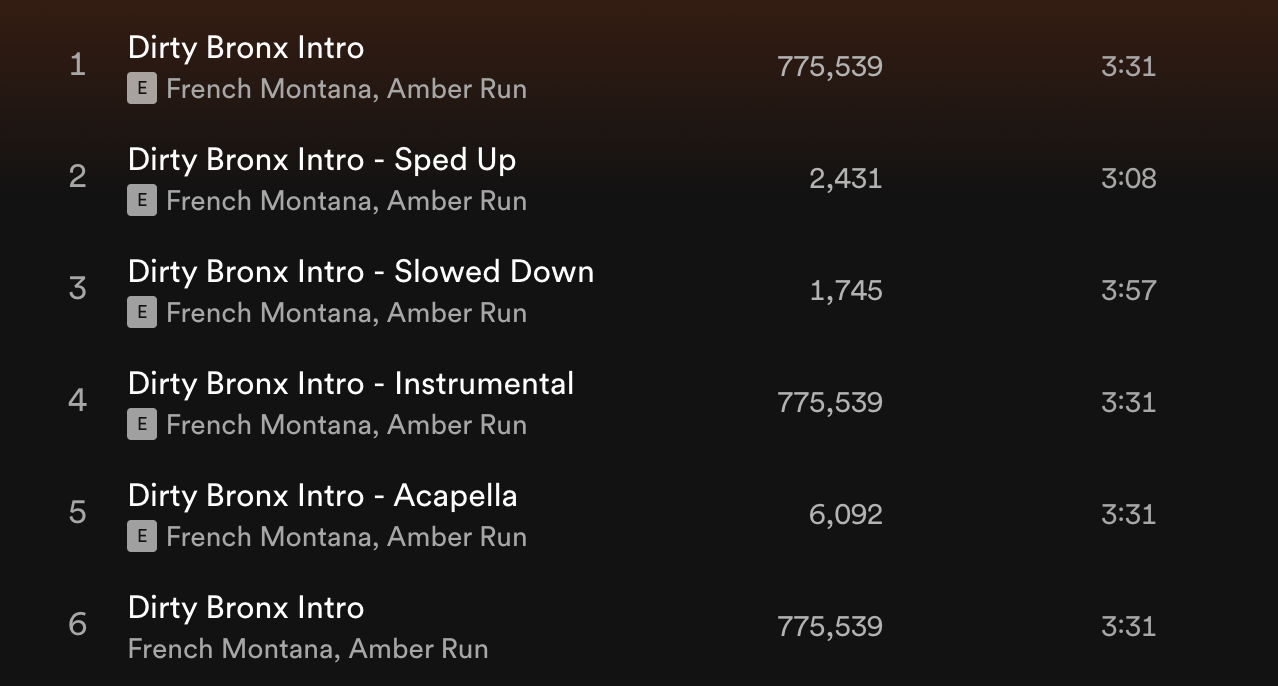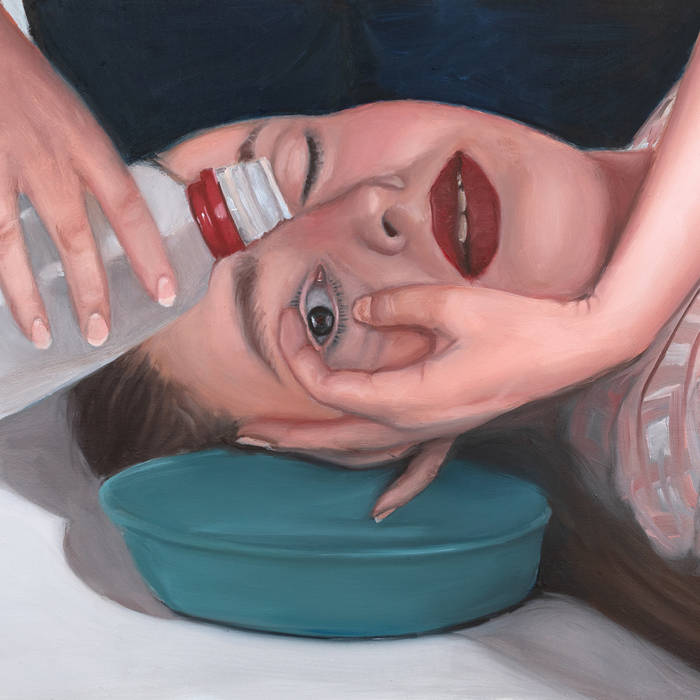WHAT HATH FRENCH MONTANA WROUGHT?
/COKE BOYS RECORDS
French Montana is spamming his own Spotify page.
Okay, folks, here are the facts. On Friday, February 23rd, 2024, French Montana Released a mixtape called Mac & Cheese 5. It’s a 21-song collection that clocks in at 60 minutes and zero seconds. Boom. One hour flat, how do you like that?
There are currently seven different versions of Mac & Cheese 5 on Spotify:
Mac & Cheese 5, for the purist.
Mac & Cheese 5 (Clean), for the family man.
Mac & Cheese (Acapella), for the raw vocal performances.
Mac & Cheese (Instrumental), for people who want the beats.
Mac & Cheese (Slowed Down), for all your chopped n screwed needs.
Mac & Cheese (Sped Up), for the ADHD-riddled TikTok youth.
Mac & Cheese (Versions), which collects all of the aforementioned versions into one 126-track-long album.
So, in theory, one could click play on the (Versions) rendition of the album, and if you listened in order, you would hear each song in slightly different permutations six times in a row. First the OG version, then sped up, then slowed down, then the instrumental, then acapella, then the clean version. Here’s what that looks like.
If you’re curious about the Time Math, that means this first three-and-a-half-minute song called “Dirty Bronx Intro” becomes a 21-minute experience when each version is stacked back to back. This all amounts to a 6 hour, two-minute runtime, a duration so gargantuan that the Spotify desktop app rounds down, not even bothering to give an exact time, instead opting to list the album as “about 6 hrs” long. It’s exhausting and amazing.
You know what’s even funnier than French Montana releasing a six-hour album packed with every possible iteration of every song? The fact that French Montana also released each of these one hundred and twenty-six songs as singles. Overnight, his artist page became a genuinely cumbersome experience to navigate, stretching the bounds of what the Spotify engineers ever considered plausible or sensible.
It’s kind of hilarious to even try scrolling through Montana’s page right now. Especially when you factor in the features listed underneath each song, the whole thing just becomes a disorienting wash of metadata. One Twitter user jokingly asked, “Yo did French Montana drop?” accompanied by a screenshot featuring a 7 by 9 grid of repeating album art. And that’s only half. It’s quite hypnotizing to take in French Montana’s mug that many times, all cast in an identical green-red glow.
Another Twitter user thought a video might be a more appropriate way to showcase the scope of Mac & Cheese 5 (Versions). They did the only logical thing and made a screen recording showing what it’s like to scroll through the entire thing, taking 18 seconds to reach the bottom.
One brave poster with the handle @Keegan59992745 took it upon himself to listen to the entire thing, leaving followers a harrowing message at the onset of his adventure, posting “See you guys in 6 hours and 2 minutes” along with a screenshot of the album page for context. Later that day, Keegan followed up, explaining that after seven hours (he had to take a break to eat), that was enough French Montana for the rest of his life. Montana may have gotten his 126 streams, but at what cost?
In general, people on Hip-hop Twitter and various message boards were quick to clown on this practice of turning a mid mixtape into something the length of a day shift or multiple Lord of the Rings movies. “All of this just to sell 43k first week,” snarked one person on Twitter. The top comment on the /r/hiphopheads thread for the album bluntly assesses, “This is so embarrassing 🤦.” Further down the same comment thread, one Redditor recognized Montana’s craven and transparent ploy for streams and hoped Spotify would take notice, stating, “That’s insane. This has to be a wake up call for something to change with streaming services. I had to see it for myself and it just ruined my night.”
Elsewhere, people were eager to point out how poorly this six-version format fits some songs. Maybe mankind wasn’t meant to hear an acapella version of French Montana’s trademarked “HAAAN” with such clarity. Others were quick to point out the absurdity of having this wealth of options available for something as inconsequential as a mid-album skit. It’s hard to look at “Skit (Sped Up),” “Skit (Slowed Down),” “Skit (Instrumental),” “Skit (Acapella)” and not find it all a little outrageous.
In fact, let’s take a closer look at the skit on Mac & Cheese 5. Taking place at a train station, we hear
Montana and an unnamed man reminisce on previous installments of the Mac & Cheese tapes. While the conversation starts centered around Montana and his music, the dialogue quickly devolves into a sexist triage against the unnamed man’s sister. Here’s an excerpt.
Man, what've you been doin', cuz?
Man, I haven't seen you in about a decade, bro
On the Lamb' with your sister
Last time I saw you, workin' on that Mac & Cheese 3
Yeah, you know, my sister leaked it
No, she leaked Vol. 4, you fuckin' dummy
Well, she leaks everywhere, anywhere she goes
She leaks like a faucet
Yeah, someone's got to fix that up with a wrench
Last time I seen your sister was the zoo
Yeah?
Yeah, and she was over there bouncin' a ball off her nose
Like a sea lion
Yeah, you know what you call your sister?
What?
Glazed donut
This continues on for about a minute until the insults peter out and make way for the next song, “Too Fun,” featuring Kyle Richh, Jenn Carter, and a hip-hop group that simply goes by the name “41.” Maybe I am too old for this. Of course, if you’re listening to the (Versions) rendition of the album, the skit is followed up by a sped-up and slowed-down version, like toying with the playback speed on a podcast, but also listening to it three times over.
Then we have what’s possibly the funniest moment on Mac & Cheese (Versions), a song called “Skit - Instrumental,” which is actually closer to a field recording than hip-hop. The track is an 87-second-long swirl of ambient noise, interspersed with light background murmurs and the sounds of a distant train car. This is all punctuated by a solitary laugh at the very end, and it’s nothing short of haunting. Brian Eno could never.
Six years ago for Vulture, Craig Jenkins described Migos’ Culture II as a “data dump,” pointing out that the album’s quality did not justify its nearly two-hour runtime. In that article, Jenkins claims that the 24-track Migos record felt like “the first deliberate artifact of Billboard chart gamesmanship” simply because it was packed with so many songs that it felt too unwieldy to even view as an album in the traditional sense. I agreed with him to some degree, but I also kinda took issue with that article at the time, arguing that Culture II wasn’t meant to be listened to all the way through or digested in any traditional way. Sure, it was a lot of content with very little quality control (wink wink, nudge nudge), but the way that most people were using this album negated any claims of data dumpage. At least they were all songs. French Montana must have seen people calling Culture II a data dump and thought, “I haven’t even begun to dump.”
One year ago, I got really interested in the “meta” of the music industry. I wrote at length about Spotify’s AI-generated playlists, TikTok’s influence on streaming and the phenomena of sped-up songs, and even the lack of visibility we have as fans when a song gets yanked offline for arbitrary reasons. Also around this time, I also wrote a piece called “Everything’s a Single Now,” in which I detail my experience stumbling upon Trippie Redd playing this same game of releasing every song off an album as a standalone single. In that case, Trippie Redd released a 25-track album called MANSION MUSIK and also released each of those songs a dedicated single. In that article, I also mentioned Coke Boys 6, a 29-song tape from French Montana and associates that indulged in the same practice.
At the time, I was mainly writing about those techniques out of morbid curiosity. I wanted to document this objectively goofy practice as it stood in early 2023 because I’d never seen anything quite like it. I never would have dreamt that one year later, Montana would be doing the same thing five times over.
So I must ask, where does it end? In 2025, will we get a French Montana album with ten versions? One album-length collection of just the bass? A version with just the adlibs? What about a slowed-down clean version? How about a sped-up acapella version with a touch of reverb? Where does it all end? I don’t have the answers, but with French Montana as our fearless leader, I’m excited to continue exploring the bounds of acceptable runtimes until the servers of Spotify overload and DJ Khaled needs to get involved.
French Montana, never stop. You are a pioneer and a trailblazer. I will follow you to the ends of the earth until you release an album that lasts years. Hell, why not drop an album that could take me to the end of my life? I’d gladly spend the rest of my days with you, just give me that sweet time-filling Spotify link and let me drift off into the void. I’m ready.













